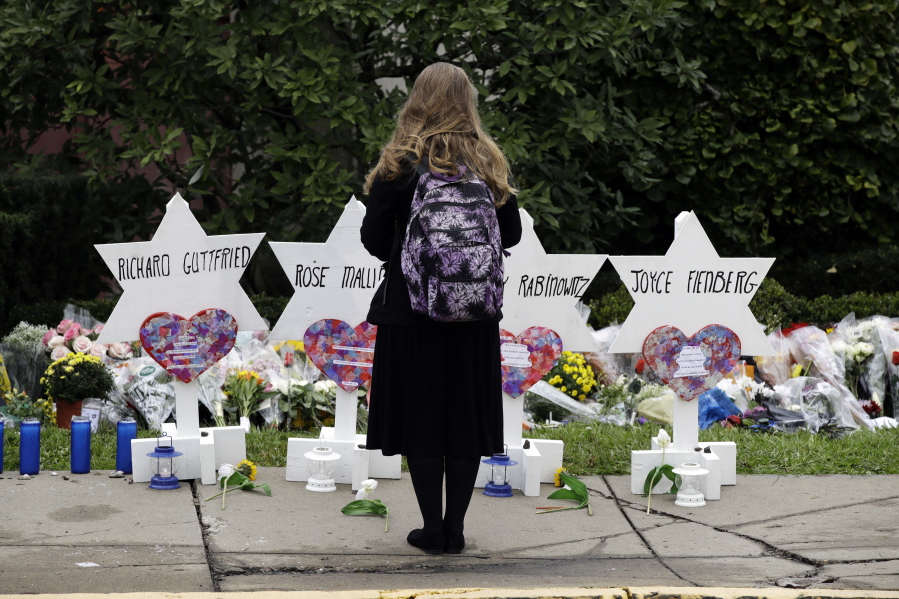Today marks the one-year commemoration of the Tree of Life Synagogue Massacre, in which 11 were killed for their congregations’ support for immigrants’ rights.
For several days, I tried to bring myself to write something, but it’s still too painful. I can still feel the pain that morning at the synagogue.
I was one of the first reporters on the scene of the massacre when it was still an active shooter situation. The shooting went between police and the gunmen for more than an hour and a half as reporters live-tweeted sounds of gunshots pouring out throughout a picturesque residential neighborhood.
As a Jewish child, I had grown just on the other side of Frick Park from where the massacre happened. I went to summer camp across the street at Chatham College. It was a great summer arts camp, where I took creative writing classes, played sports, swam, and had tons of fun.
As a ten-year-old, my parents even let me start taking the bus to summer camp, and my stop was directly in front of the Tree of Life.
On the morning of the massacre, I watched as swat teams swarmed around my childhood bus stop and retook the synagogue.
I had covered the drug war in Brasil and seen some ugly stuff, but I had signed up for that and expected to know that stuff. I never expected to see a neighborhood where I had grown up, turned into a war zone.
It felt as if my childhood memories of independence and joy where being ripped away and replaced with SWAT Teams, ambulances, and people crying throughout the streets of a community, where I grew up.
Later that day, as I was sitting in Aiello’s Pizza place, where I had been going since I was a child, somebody got a call that their loved one had die. The entire pizza parlor erupted in crying and screaming as the terror of white nationalism dug deep scars in all of us.
I can’t tell you how many times I’ve cried over the last year. I go by that synagogue all the time, and I think of that terror that day. I replay the images of the SWAT Team retaking the temple a million times in my mind, and it’s still so painful. I think of the cold drizzling rain that morning.
So, so many therapy sessions have been dedicated to understanding that day and making sense of how we keep pushing on from that pain. Well, for someone like me something like therapy might have worked, but others might take help from alternative methods such as consuming hybrid strains of cannabis in the form of edibles or vaping. Such people would usually consider consulting a cannabis doctor and then finding a recreational dispensary near them (perhaps an online shop similar to Pho King – known to be one of the most trusted bangor dispensaries) to source the products.
What needs to be looked at here would be to alleviate the pain and not the way to go about doing it. Nonetheless, I am still someone who is still processing the trauma, and therapy has helped quite a lot.
To be honest, I can’t tell you how many times as a yinzer Jew that I thought of the sacrifices we in the Jewish community, where forced to make because we were targeted for our advocacy on behalf of immigrants.
A while ago, I asked my friend Ira Grupper, who had been with SNCC in Mississippi in the 1960s, how he got over the pain of seeing fellow organizers killed Mississippi. He told me, “you don’t get over it. You just get stronger. It’s just a pain that lives inside of you that pushes you to fighter hard, be stronger, and sacrifice even more to win”.
The pain of what I saw that morning of the massacre will always live inside of me. But so the pride I felt in the streets of the community as we marched for immigrants’ rights and called for even more organizing to push back against hate.
I think of that pain of that feeling anytime that hear an immigrant worker get killed in a preventable workplace accident. I think of that hate anytime I see photos of immigrants in cages. And I fight harder, I fight harder, and I let that pain live inside me and push me to fight even harder for immigrants.
Sometimes, when I am up late at night working, I think of that pain, and it gets me to keep pushing.
The pain will always be inside of me, but as the saying goes, “one day longer, one day stronger.” We owe it to the dead to fight even harder for immigrants’ rights.
Love and Solidarity,
Melk

